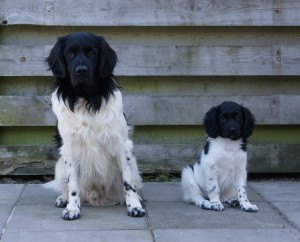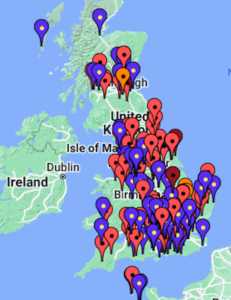Dog Trainer and Behaviourist, Helen Withey on what to consider before introducing a second dog into your home.

Best friends: René Rigterink’s two dogs, Chess and Mearke
Do you think it would be a good idea for me to get another dog?
This is a question I get asked often. The answer, however, is far from simple and depends in particular on the character of the first dog and the lifestyle of the owners.
Let’s look firstly from the dog’s point of view. They are generally social animals who enjoy company whether that is with us or other dogs. But sometimes you do find a dog that is content with just his human friend.
If you really want a second dog, consider whether your house and garden are big enough. One dog is normally happy with a small house and garden to potter around in, but once you add another, they tend to play harder and need a lot more outside space to stretch their legs and run. Also do you have enough time for a puppy? It is easy to forget how time-consuming they are in the first few months: toilet training, socialisation and so on. Plus there needs to be someone around most of the time.
Finance is also an important factor. Can you afford a second dog; twice the vet bills and pet insurance, annual vaccinations and excess every time the dog needs medical treatment. Food bills will also increase and the cost of having them looked after while you are on holiday if you can’t take them with you will most likely double too.
“Is your home and garden big enough for two dogs?”
The next thing to consider is whether to get a dog or bitch. Obviously if you go for the same sex as your other dog there will be no problems with accidental matings. If you choose the converse you need to have enough space to be able to keep them apart while the girl is in season – for several weeks of the year.
Timings
The best time to get a second dog is normally when the first one has reached three years of age. By this time they will be confident, well trained and know all the house rules so when the new puppy arrives the first dog will help to teach them all the right things. A three year old dog is also still youthful so they will play and interact with the new addition. Bearing this in mind though, you will still need to separate the dogs occasionally and train the puppy on its own to build a good strong bond with you and your family. Left to their own devices, a puppy will bond very closely with the older dog which can lead to problems later on if for any reason they need to be separated.
Once you have taken all of this into account, the final step is to source a good breeder. Get to know them well, and bring your dog so that they get an idea of which puppy will be the best match for you both. No one knows each dog in a litter of puppies as well as their breeder, so have faith and let them choose for you.
Finally, it is worth trying before you buy. Offer to dog sit a friend’s dog and get a feel for what it is really like to look after two dogs instead of just one.
Do all of this and you have the best chance of becoming a contented multi-dog household.








